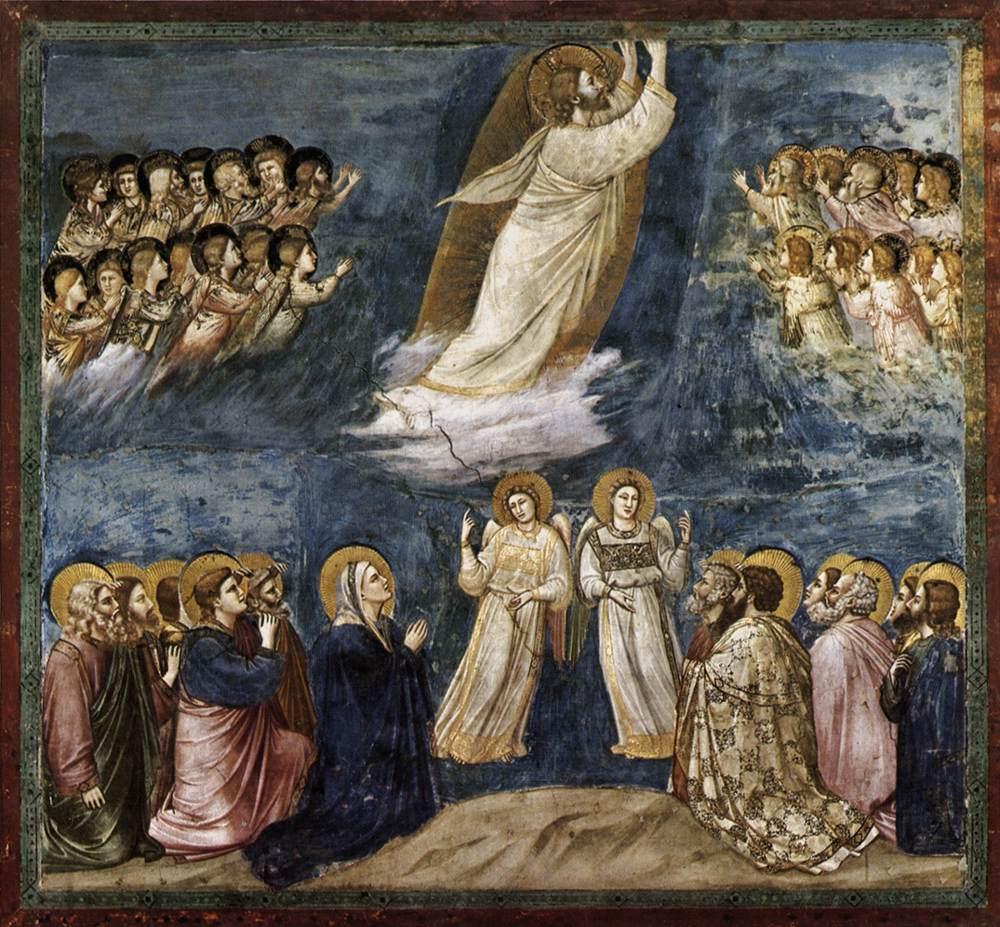Commentary by Hovak Najarian
After the resurrection, Christ’s last appearance to the disciples was at his ascension. He blessed the disciples and then “withdrew and was carried up into heaven.” A description of the ascension in Acts of the Apostles adds, “while they [the disciples] beheld, he was taken up; and a cloud received him out of their sight. And while they looked steadfastly toward heaven as he went up, behold, two men [portrayed usually as angels] stood by them in white apparel; [They] said ‘Ye men of Galilee, why stand ye gazing up into heaven? This same Jesus … shall so come in like manner as we have seen him go into heaven.’” (Acts 1:9-11)

The Ascension, Rabbula Gospel, 6th century. (Wikimedia Commons)
The illustration of Christ’s ascension in the Rabbula Gospel Book shows the disciples standing at the lower half of the illumination looking up at Jesus. Two men in white robes are talking to them and pointing upward. At center foreground, Mary is raising her arms but is not looking upward. Instead, she is looking out at the person that would be reading the gospel book. In the upper half, Jesus is surrounded by an aureola (a body halo) with angels assisting him skyward.

Ascension from a Breviary, French, c. 1506-1516. Source: “Iconography of the Ascension, Part III of IV — The Disappearing Feet” on Ad Imaginem Dei
Paintings of Christ’s ascension were based also on the statement, “he was taken up; and a cloud received him out of their sight.” In these paintings, Jesus is ascending into a cloud with only a lower portion showing. He is leaving pictorial space into the space beyond the painting.
[When a person in a painting is seen from the back, the placement of a halo presents a problem. Note the halo on the disciple wearing a yellow mantle (right foreground).]
The Ascension of Christ, fresco, 13-4-1206, Giotto, 1275-1337

Giotto, The Ascension of Christ (Wikimedia Commons)
The Ascension of Christ by Giotto contains echoes of the work of other artists. Like the illustration in the Rabbula Gospel, Giotto’s disciples and Mary are in the foreground. Here, however, they are kneeling and their attention is focused on the two centrally located men in white apparel. These men – depicted with wings and assumed to be angels – are floating above the ground pointing to the sky and talking to the disciples and Mary. Jesus is above them and portrayed in greater size than the other figures.
As in other paintings of the ascension, Christ is surrounded by a golden mandorla – the term is from the Italian word for almond which it resembles in shape – but unlike many illustrations, he is not looking down, and Giotto’s angels are not assisting in his ascent. Instead, Jesus is already above the cloud that received him and is being greeted by a chorus of angels with arms raised in praise. Christ in this fresco is in profile and as he ascends heavenward, his hands have entered partially into the space beyond the painting itself.
Hovak Najarian © 2024










